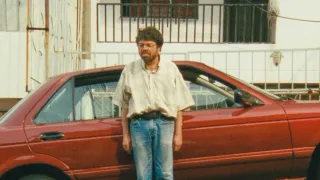June 4, 2016
As HIV Marks 35 Years, Leaders Reflect
Brian Bromberger READ TIME: 9 MIN.
This year marks the 20th anniversary of the widespread distribution of the protease inhibitor drug cocktail (the highly active anti-retroviral therapy regimen), as well as the introduction of the viral load test so doctors could monitor the progression of the HIV virus in the body.
Both advances transformed AIDS from a near automatic death sentence to a chronic condition by reducing the HIV virus to undetectable levels. For those who have struggled with HIV for many years, it is an extraordinary accomplishment to be alive and thriving today, with some returning from the brink of death.
As the 35th anniversary of the first reported cases of what would become known as AIDS is observed June 5, the Bay Area Reporter interviewed three longtime HIV-positive men. Cleve Jones, 61, is a co-founder of the San Francisco AIDS Foundation in 1982, as well as the creator of the Names Project AIDS Memorial Quilt in 1987. HarperCollins published his first memoir, "Stitching a Revolution," in 2000. His new book, which inspires the forthcoming ABC miniseries "When We Rise," will be released in November.
Gabriel Quinto, 55, is the first known HIV-positive person elected to public office in the Bay Area after he won a seat on the El Cerrito City Council in 2014. He is currently running to be a voting member on the Democratic Central Committee in Contra Costa County.
Terry Beswick, 56, is the executive director of the GLBT Historical Society. He has a long list of HIV advocacy positions, including serving on the White House Office of National HIV/AIDS Policy and the National AIDS Program Office of the Department of Health and Human Services, both during the Clinton administration, as well as a co-founder of ACT UP San Francisco.
All three said without hesitation that were it not for the drugs that came to market in 1996 they would probably not be alive today. But as wonderful as these medications can be for extending life, they don't work for everyone and they said they knew gay men who have died of HIV-related conditions in the last few years, even if it was not listed as the official cause of death. There are side effects to these drugs and people age faster after long-term use, getting conditions such as cancer and heart disease in their 40s and 50s rather than their 60s and 70s.
AIDS may now be manageable, but all three men were adamant it is not something one wants to deal with or "manage," being much more than an inconvenience.
"Even though I had worked on committees to accelerate access to these drugs, and interviewed key researchers who believed they would be huge advances, I was emotionally numb and skeptical whether they would actually pan out," Beswick said. "How many treatments had we gone through that had failed? It was like guess work on who would live and who would die. People who tried nothing survived, and those who tried everything died. At best, all one could say was that the protease inhibitors might extend your life span six months."
Jones recalled that when he brought the AIDS quilt for its final big display to Washington, D.C. in 1996, "I talked to President Clinton on how my friends were now thriving and asking him to make sure these drugs would be available to everybody."
Jones, positive since 1985, suffered pneumocystis pneumonia in 1994. He was treated with intravenous pentamadine, but had moved up to the Russian River to die, before the cocktail saved his life.
Quinto, as a Filipino-American, had long been a test subject for new drug trials. HIV-positive since the mid-1980s, but felt he didn't have a choice: Either do it or die. He was given a year to live. He sold everything he owned, including his musical instruments (he had played in a Los Angeles rock band) so he could travel.
"These drugs were not tested for people of color, and the side effects could make you feel worse than the disease itself," he said. "Many of my friends could not take these drugs and gave up. Questions like where they would live after being kicked out of their apartments, plus the added stress of taking meds that made you sick to your stomach, left them little alternative but to take their own lives. The current medications have not raised my number of T cells above 150, so consequently I have good days and bad days when I need to rest."
Beswick wasn't diagnosed HIV-positive until 2001, but even in the 1980s he knew he would be positive at some point, which only accelerated his activism.
"I had a sense of fatalism and when I started using crystal meth and having unsafe sex, exposing myself to the virus, I figured it was only a matter of time as the whole gay community was a ticking time bomb," he said. "I was fighting for younger kids so they wouldn't have to worry about getting this disease on their first sexual encounter. It was after I got clean that I started taking the cocktail. There were side effects such as weird nightmares, disorientation, and gastrointestinal problems, all of which eventually passed."
Jones had to change medications every six months, since he suffered every side effect, "including persistent pain, disfigurement, and facial wasting, everything but death."
All three men now take two pills a day and suffer no side effects.
Survivor's Guilt
When asked about survivor's guilt, having lived when so many others died, their responses varied.
Jones, almost choking up, replied, "I think about them every day. People who didn't live through this epidemic cannot comprehend it. I lost almost everyone I knew. I made new friends and they died. I made more new friends and they died. Ultimately we lost over 20,000 gay men in the 10-block radius of Castro Street. Most of my fellow activists didn't make it. When I think if they had survived, how many of them would be serving in Congress, or taking home Emmys and Pulitzers ... the loss is incalculable. But I don't believe in survivor's guilt. I'm just grateful."
Spearheading the historical society, Beswick is very conscious of lovers and friends who died. The society's GLBT History Museum currently has an exhibit of dancers who passed from AIDS and held a panel discussion on AIDS activism.
"Yet even with all the documentaries and books, it doesn't seem enough," Beswick said. "I spent my 20s and 30s in a state of extreme anger, which I channeled into activism. I'm still in a post-traumatic stress phase and how I've dealt with their death hasn't always been healthy, but through productive archival projects helping to tell their stories, there has been some healing."
Quinto was obsessed about all the people who died.
"I dealt with more end of life issues in that 10-year period than most people in a lifetime, especially since there was little help for Asian Pacific Islanders," he said. "We had to take care of our own, as people who looked like me were not welcome in the Castro. I went mad because of it. I had a breakdown in late 2000 with a slow recovery, getting out from under a severe depression. I've had many years of anger. Fits of rage would just come out of me. It wasn't pretty. I didn't know how to handle it or who I was angry at, but years of therapy have made a huge difference."
Stigma
Jones, Beswick, and Quinto all experienced stigma because of their diagnosis, but mostly from other gay men, who rejected them as sexual partners. Jones believes that the stigma surrounding HIV is still one of the strongest forces contributing to its continuation.
"Guys are still afraid of being tested because of the stigma," Jones said. "I feel sad for young people because their experience of the pandemic is different from my generation. They don't have the solidarity we had. Even if they get tested, they are reluctant to talk about their status with their friends or sexual partners. The amount of shaming on social media and hookup apps is pretty appalling."
Beswick has also experienced similar sexual stigma, "but overall I have been fortunate because I have lived mostly in Washington, D.C. and San Francisco, so I've been protected from discrimination with things that matter, such as housing, jobs, and access to health care."
Quinto experienced "people screaming at me when I told them or someone who I thought was my friend, a neighbor, punched me out. For Asian people, they worry about losing their jobs or embarrassing their families. As an elected official, I'm on the disability caucus of the Democratic Party. I care very deeply about homelessness, mental illness, folks not getting their medications because they can't afford them, all issues related to stigma.
"The media needs to interview people from our communities rather than the same people over and over again," Quinto said. "We don't want to hear a white urban middle class version of this disease only. We want to see people of color and people in suburbia and rural communities. It's not just a San Francisco disease."
Lack of Urgency
There has been a decrease in media attention surrounding HIV/AIDS, despite the fact that people continue to test positive for the virus and people still die of AIDS-related complications.
Beswick wondered whether silence on the issue could be "compared to post-Holocaust survivors who were initially reluctant to speak about it but became more vocal as the years went by."
Jones observed that once the majority of new infections shifted to predominantly people of color and poor people, major LGBT organizations, largely composed of middle class white people, stopped talking about HIV at all.
"Racism is still very strong within the LGBT community," Jones, who is white, said. "We have a shocking situation in Atlanta where African-American men are showing up in public hospitals with AIDS conditions such as pneumocystis pneumonia, not even knowing they are HIV-positive, having never been given a blood test. This vulnerable population is still not getting access to medical care and being properly treated, despite a high infection rate. They don't feel welcome at these medical centers, which is a recipe for disaster all over the country."
35 Years of AIDS
When asked about the lessons drawn from 35 years of AIDS, all three interviewees struck similar themes.
"The biggest lesson is for people to be honest. Human beings are sexual creatures with few exceptions and, for most people, sex is a very powerful force in their lives, so we need to be open and clear when adopting harm reduction models," Jones said. "Young people think that if they tell you they are positive, others will think they are on crystal or a slut. We need compassion for each other. I have hosted potlucks for young HIV-positive guys so we can talk about these issues, as they feel isolated.
"Older gay men need to realize that it is the same issues they had to contend with that led young LGBT kids to kill themselves and to fill our bars every night," he continued. "As gay people our collective experience has improved, but not necessarily our individual experiences. Gay kids are still beaten up. Parents still throw their gay kids out of their homes. Kids still stay up all night praying to Jesus to cure them. If we think that has gone away, then we are being stupid and cruel."
For Beswick, it was not just AIDS but also civil rights that "taught our community to band together and establish leadership and organizations. What we were best at was to use our intelligence to follow the science and to let the science inform our advocacy around public policy, rather than to be driven by fear alone.
"We need to meet people where they are at and base public health policy on science rather than morality," Beswick added. "My big goal is to build a bigger LGBT museum (than the one in the Castro), complete with an educational and cultural center so we can tell the story of AIDS more effectively and learn not to make the same mistakes we made 20, 30 years ago."
Quinto wants more activists and political advocates, especially in Sacramento.
"I'm hoping there will be more LGBT people running for public office, especially those who are frustrated with how things are," he said. "We need more legislation to support our community, with funding for more drug trials. What got me out of my depression was the need to be engaged. I didn't want to wait to die anymore but decided to make a difference. Being HIV-positive influenced my decision to run for city council and be honest about my status.
"People want and need to hear stories of survival. Some politicians told me I shouldn't talk about my past because it could ruin my career, but this is part of who I am and people will have to get over it," he said. "I am excited about being a mentor to young LGBT people running for city councils in the East Bay. An HIV-positive young man, hearing about me, decided he wants to be a candidate for the central committee for the Democratic Party in Contra Costa County. I have a responsibility to the next generation to pass on what happened during this epidemic and what we learned. I can't be silent any longer and neither can our community."
Yet it was Jones who made a link between the AIDS era and today.
"I think marriage equality came out of our struggle with AIDS. For my generation of radical activists, marriage was not on any of our priority lists," he said. But during AIDS, I had friends who, having buried their partners, were thrown out of their apartments since they weren't on the lease. I saw men die because they couldn't access their partner's employee benefits. Suddenly that little piece of paper became critically important. And that's why working class gays and lesbians lined up when Mayor Gavin Newsom opened up City Hall in 2004 so they could get married, despite flack from the political establishment."






